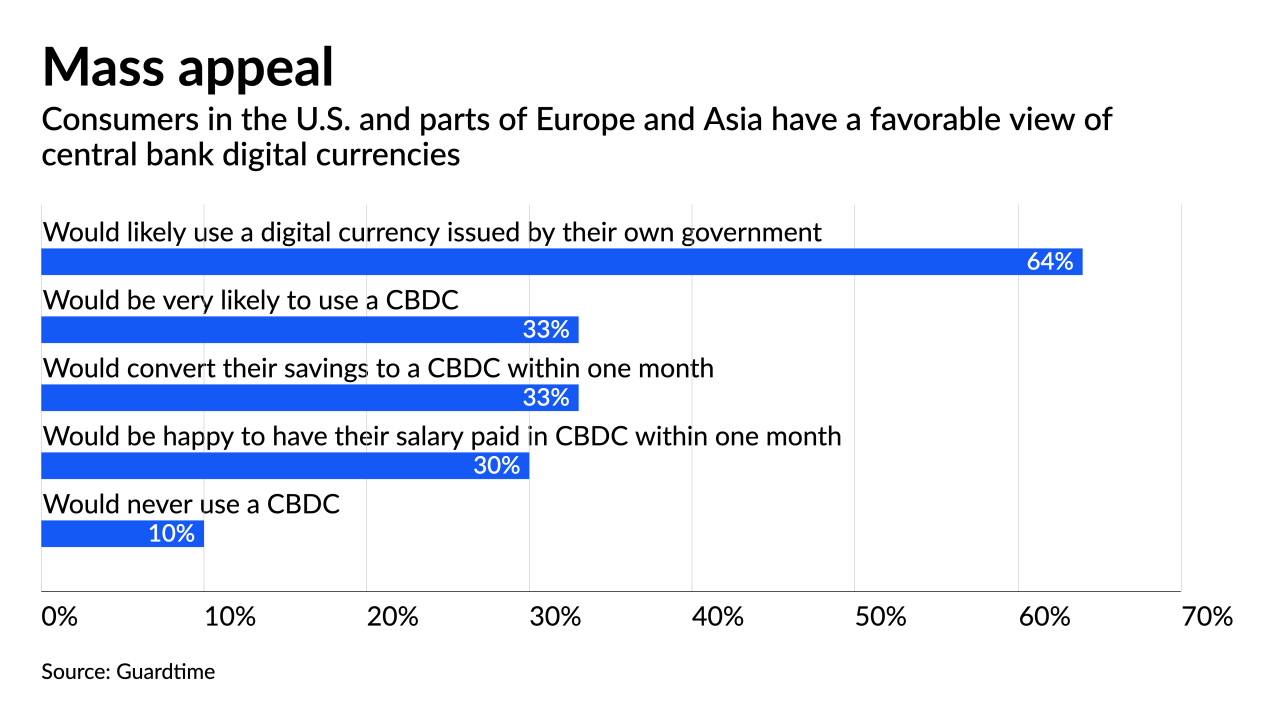-
The ECB president said demand for higher-skilled workers who can use AI would rise, while those less able to learn new skills could suffer.
April 1 -
The country's central bank cited geopolitical uncertainty and the increased reliance on digital payments as a reason to focus on offline payments as a backup. Also, a look at U.K. bank outages and other news in American Banker's global payments and fintech roundup.
March 12 -
The cryptocurrency exchange made the move to follow the Markets in Crypto-Assets Regulation, which tightens rules for digital assets in the European Union.
January 31 -
Banks must comply with a European Union law known as DORA by Friday. The law aims to improve cybersecurity and reduce tech failures in financial services.
January 15 -
A new EU law that requires interoperability and universal support for instant processing goes into effect this week, providing clarity that the U.S. lacks, while ABN Amro says restrooms generate transaction revenue. That and more news in this week's global payments roundup.
January 8 -
The technology company faces fines over potential anti-competition practices; Takis Georgakopoulos is on his way to Fiserv.
June 26 -
In an ongoing case, Citi and the New York attorney general are disputing who is responsible for wire transfer fraud that drained a customer's retirement savings.
April 15 -
Elizabeth McCaul, the first American to serve on the European Central Bank's supervisory board, talks crypto controls, systemic risk and the need for regulators on both sides of the Atlantic to do a better job of harnessing data.
December 13 -
"Apple may have restricted competition, to the benefit of its own solution Apple Pay," Margrethe Vestagar of the European Commission said. It's an accusation Apple's fought many times across the globe.
May 2 -
Germany has emerged as the main roadblock to broaden European Union sanctions against Russia by targeting the country’s biggest bank and its energy sector.
March 9 -
The European Union is discussing the exclusion of seven Russian banks from the Swift financial messaging system, but the proposed list spares the nation’s biggest lender and a bank part-owned by the Russian gas giant Gazprom.
March 1 -
Western central banks trying to develop sovereign cryptocurrency models face pushback from lawmakers and other obstacles, while the digital yuan has a much clearer path.
July 27 -
The European Union has updated value-added-tax regulations that predate digital payments, hoping to reduce compliance burdens for foreign online sellers and simplify consumer billing.
July 19 -
An initiative among EU nations called Project Jura focuses on financial institutions as the users of central bank digital currencies, removing variables that could slow testing and deployment.
June 30 -
U.S. regulators blocked the card network's attempt to buy Plaid last year for antitrust reasons. Its bid to acquire Tink, a similar company based in Sweden, may have a better shot given European officials' desire to promote open banking.
June 24 -
A European Union regulation that promotes data sharing among banks and third parties is making it easier for neobanks like Tide and Monese and other companies to help small merchants track their cash flow and access credit.
June 17 -
The initiative would standardize and expand security, but marketing restrictions weigh against the business case for adoption.
June 2 -
EU regulation permits digital connections between banks and fintechs, creating ways for pension providers and brokerages to streamline payment acceptance and cut costs by replacing manual processes with automated ones.
June 1 -
Small businesses are upset at Visa and Mastercard's proposal to raise rates on cross-border payments initiated online, now that the European Commission's caps on credit and debit fees no longer apply in the U.K.
May 21 -
Apple Inc. was handed a European Union antitrust complaint over its app payment rules, drawing one of the world’s toughest competition enforcers into a global battle over fees for downloads on smartphones and tablets.
April 30


















